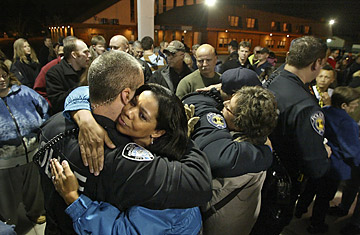
Black Diamond police officer Brian Lynch, left, gets a hug from Lakewood resident Roberta Ladd as others in the crowd offer condolences to police officers after a candlelight vigil at the Champions Centre in Tacoma, Wash., on Nov. 29, 2009
The news that Maurice Clemmons' rampage had come to an end brought an immense sense of relief to the citizens of the Seattle-Tacoma area. The nearly 48-hour manhunt for him had gripped Washington State since early Sunday morning, Nov. 29, when Clemmons reportedly walked into the Forza Coffee Co., a shop in a strip mall in the Tacoma suburb of Parkland, reached into his jacket, pulled out a gun and opened fire on four officers from the town of Lakewood who were working on their laptops. It ended on a dark street in south Seattle just before 3 a.m. on Tuesday, when Clemmons was gunned down after trying to evade a police officer who had recognized him during a stolen-car check.
But a foreboding lingers. The nearly two days of anxiety deepened concern about how effective the judicial system is at rehabilitating violent felons like Clemmons — or keeping them behind bars and away from harming the innocent. The search for Clemmons consumed everyone. The steady drone of helicopters could be heard for miles around the Leschi neighborhood in east Seattle, where agents believed Clemmons was hiding in a relative's house. Streets surrounding the home were blocked off and residents turned away; people who lived in the area were told to stay indoors and keep their homes locked up. But when the cops broke into the targeted house, the suspect was not to be found.
There was fear that Clemmons could pop up anywhere. Tips and sightings came in from all over. Someone believed they'd seen Clemmons getting off a bus in the University District, home to the University of Washington, in the northeast part of the city. Another call came in suggesting that Clemmons had been spotted at Jose Rizal park in the Beacon Hill neighborhood of south Seattle. Officers were dispatched to bus and train stations. As the search grew more frantic, frustration and fury over the murders grew too. In a demonstration of restrained anguish at a midmorning press conference during the search, Lakewood police guild president Brian Wurts said emphatically, "This guy should have never been on the street." Visibly agitated, he continued, "I think this country needs to get together and figure out why these people are out."
Clemmons, 37, had been back on the streets for less than a week when he allegedly shot the police officers in the coffee shop. He was released on bail on Nov. 23 after being held in jail since July on eight felony charges, including child rape and assault, that were originally lodged in May. Pierce County judges set bail for the two sets of charges at $150,000 and $40,000, respectively, in spite of the prosecutor's objections that they were too low. Clemmons was able to secure the funds from Jail Sucks Bail Bonds, in Chehalis, Wash.
Clemmons has a history of getting out of jail, despite an alarming criminal record. As a 17-year-old living in Arkansas, he was sentenced to consecutive prison terms totaling nearly 100 years for five different felony charges, including robbery and illegal possession of a handgun. During his courtroom appearances, he frequently exhibited unruly and violent behavior, throwing things and even lunging for a guard's handgun. Yet in 2000, citing the young age at which he had been sentenced and his newfound devotion to God, Clemmons, then 27, wrote a letter pleading for clemency from then governor Mike Huckabee. In the letter, obtained by the Seattle Times, Clemmons wrote, "I have never done anything good for God, but I've prayed for him to grant me in his compassion the grace to make a start. Now I'm humbly appealing to you for a brand new start." In August of that year, Huckabee commuted Clemmons' sentence, making him eligible for parole. He was released.
He promptly violated parole, was in and out of prison, then moved West to avoid the Arkansas penal system. He tried to start a lawn-care business but never got out of trouble with the law. In May this year he began talking about his ability to fly and his feeling that the Secret Service was looking for him. Clemmons also said he believed he was the Messiah and that the President would soon acknowledge him as such. But on Nov. 28, Clemmons apparently wasn't reflecting on his relationship with God. Ed Troyer, spokesman for the Pierce County sheriff's office, told reporters that on that night Clemmons was bragging to friends that they should look out for news stories the next day because he was "going to kill some cops."
At the coffee shop, the first two cops were "flat-out executed," Troyer said. The other two officers struggled with the gunman — and one managed to shoot him in the abdomen — before they were killed.
Huckabee expressed regret over his decision to commute Clemmons' sentence, explaining on a Fox News program, "If I could have known nine years ago this guy was capable of something of this magnitude, obviously I would never have granted a commutation. It's sickening." Clemmons' rampage is now over, but it has raised many questions about the management of the country's criminal underclass, and the reverberations of those issues will continue for a long time.
